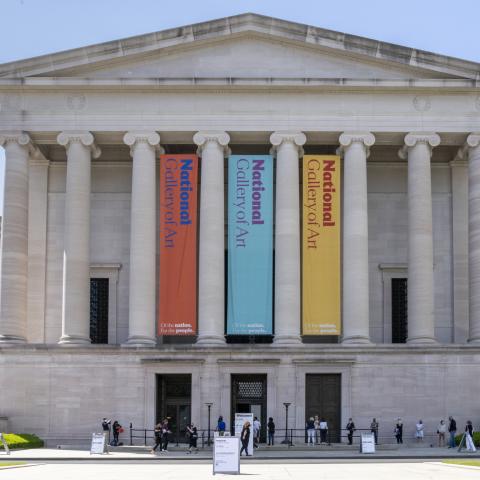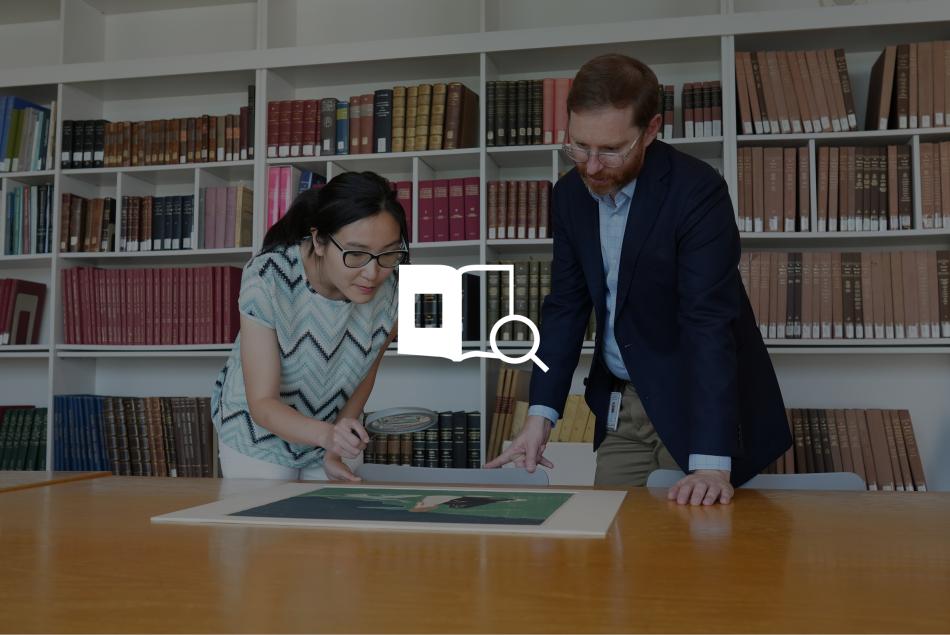Portrait of the Artist's Parents, Salomon de Bray and Anna Westerbaen
1664
Jan de Bray
Painter, Dutch, c. 1627 - 1688

Jan de Bray almost certainly painted this compelling double portrait in May 1664 as a posthumous tribute to his parents, shortly after they had succumbed to the plague in Haarlem. This stark double-profile image has a timeless quality that is enhanced by the parents' simple black dress and austere surroundings. Jan represented Salomon (1597–1664) with his left hand outstretched as though he were about to speak, a rhetorical pose that identifies him as a man who excelled at intellectual pursuits. His skullcap, dark mantle, and simple white collar—all common scholarly attire—reinforce this association. De Bray stipulated in his will that the painting should be given to the city of Haarlem in order to preserve the memory of his parents as respected citizens of the city, a stipulation, however, that was never carried out.
The profile portrait was a common format on Roman coins, cameos, and celebratory medals depicting individuals of high birth and rank. The tradition of portraying famous men and women in this manner was revived in the Renaissance and continued in the Netherlands in the seventeenth century, specifically in representations of the Prince and Princess of Orange. De Bray's use of overlapping profile portraits, however, is found only rarely in seventeenth-century Dutch and Flemish painting; an important precedent, Agrippina and Germanicus, by Peter Paul Rubens (1577–1640), is also in the National Gallery of Art’s collection. De Bray, who may have been familiar with that work, chose a similar pose to imbue this image of his parents with classical ideals of dignity and permanence.

West Building Main Floor, Gallery 46
Artwork overview
-
Medium
oil on panel
-
Credit Line
Gift of Joseph F. McCrindle in memory of his grandparents, Mr. and Mrs. J. F. Feder
-
Dimensions
overall: 78.1 x 63.5 cm (30 3/4 x 25 in.)
framed: 99.7 x 85.7 x 8.9 cm (39 1/4 x 33 3/4 x 3 1/2 in.) -
Accession Number
2001.86.1
More About this Artwork
Artwork history & notes
Provenance
The artist [c. 1627-1697]; possibly bequeathed to Gaeff Fabritius, former burgomaster of Haarlem.[1] John Charles Robinson [1824-1913], London; (his sale, Hôtel Drouot, Paris, 7-8 May 1868, no. 11); Reiset, for Princess Mathilde [1820-1904, née Mathilde L.M. Bonaparte], Paris;[2] (her estate sale, Galerie Georges Petit, Paris, 17-21 May 1904, 1st day, no. 21). Agénor, duc de Gramont [1857-1925], Paris; (his sale, Galerie Georges Petit, Paris, 22 May 1925, no. 7); Joseph Fuller Feder [d. 1944], New York;[3] by inheritance to his daughter, Mrs. George Monroe Moffett [d. 1956, née Odette Feder, formerly the Countess du Bourg de Bozas and Mrs. J. Ronald McCrindle], New York;[4] by inheritance to her son, Joseph F. McCrindle [1923-2008], New York; gift 2001 to NGA.
[1] The artist drew up his first will on 17 June 1664, leaving his entire estate to his younger brother, Dirck, and bequeathing "...to the Honourable Gaeff Fabritius, erstwhile burgomaster of the city of Haarlem, a portrait of his testator and a portrait of his late father and mother, standing and viewed from the side, providing that on the death of the said Gaeff Fabritius both portraits shall pass to the city of Haarlem." ("Ten tweede aen den E. Heere Gaeff Fabritius oudt burgenmeester deser voorn. Stadt Haerlem sijns Testateuren conterfeystel metter pleth, mitsgaders het conterfeytsel van sijn voorn. overleden vader ende moeder staende in een stuck ende van ter seyden geschildert mits dat beyde de voorn. conterfeytsels naert overlijden van den voorn. Gaeff Fabritius sullen moeten commen ende vervallen aende voorn. Stadt Haerlem.") The artist eventually drew up six wills, the last in 1683, and after incurring debts he could not pay, applied for a dispossession order and was declared bankrupt in 1689. (See Jeroen Giltaij in Dutch Classicism in Seventeenth-Century Painting, ed. Albert Blankert [exh. cat., Museum Boijmans Van Beuningen, Rotterdam; Städtelsches Kunstinstitut, Frankfurt 1999-2000], Rotterdam, 1999: 276-279.)
[2] An annotated copy of the sales catalogue in the NGA Library indicates that the painting was acquired by Reiset for Princess Mathilde. It is not known where or when Robinson, who was curator at the Victoria and Albert Museum, London, acquired the painting.
[3] Annotated copy of sales catalogue, Getty Research Institute, Los Angeles. Feder also acquired Largillierre's Portrait of a Young Man with His Tutor (NGA 1961.9.26) at this sale. A photograph in the NGA curatorial files of the Feder apartment in The Sherry-Netherland on Fifth Avenue in New York shows the painting hanging in the living room.
[4] According to the entry in Dutch and Flemish Paintings from New York Private Collections, exh. cat., National Academy of Design, New York, 1988: no. 6, which refers to an annotated catalogue in the Frick Art Reference Library, New York.
Associated Names
Exhibition History
1957
Loan to display with permanent collection, Brooklyn Museum of Art, 1957-1981.
1980
Dutch Seventeenth-Century Portraiture: The Golden Age, The John and Mable Ringling Museum of Art, Sarasota, 1980-1981, no. 13, repro.
1981
Loan to display with permanent collection, The Art Museum, Princeton University, 1981-1999.
1988
Dutch and Flemish Paintings from New York Private Collections, National Academy of Design, New York, 1988, no. 6, repro.
1999
Dutch Classicism in Seventeenth-Century Painting, Städelsches Kunstinstitut, Frankfurt; Museum Boijmans Van Beuningen, Rotterdam, 1999-2000, no. 53, repro.
2000
Small Northern European Portraits from The Walters Art Gallery, Baltimore, National Gallery of Art, Washington, D.C., 2000, brochure checklist no. 39.
2005
Jan De Bray and the Classical Tradition, National Gallery of Art, Washington, D.C., 2005, brochure no. 2, repro.
2007
Dutch Portraits: The Age of Rembrandt and Frans Hals, The National Gallery, London; Royal Picture Gallery Mauritshuis, The Hague, 2007-2008, no. 6, repro.
2008
Painting Family: The De Brays, Master Painters of 17th Century Holland, Frans Hals Museum, Haarlem; Dulwich Picture Gallery, London, 2008, no. 29, repro.
Bibliography
1938
Moltke, Joachim Wolfgang von. "Jan de Bray." Marburger Jahrbuch für Kunstwissenschaft 11/12 (1938/1939): 426, 483-484, no. 177a.
1964
Marel, Ary van der. "De kunstschilders de Bray en hun familie." De Nederlandsche Leeuw 81 (January 1964): 6-26.
1980
Wilson, William Harry. Dutch Seventeenth-Century Portraiture: the Golden Age. Exh. cat. The John and Mable Ringling Museum of Art, Sarasota, 1980: unpaginated, no. 13.
1988
Adams, Ann Jensen. Dutch and Flemish Paintings from New York Private Collections. Exh. cat. National Academy of Design, New York, 1988: no. 6, repro.
1990
Broos, Ben P. J., ed. Great Dutch Paintings from America. Exh. cat. Royal Picture Gallery Mauritshuis, The Hague; Fine Arts Museums of San Francisco. The Hague and Zwolle, 1990: 193 fig. 2.
1993
Broos, Ben P. J., and Marijn Schapelhouman. Nederlandse tekenaars geboren tussen 1600 en 1660. Zwolle, 1993: 62, fig. d.
1999
Blankert, Albert. Dutch classicism in seventeenth-century painting. Exh. cat. Museum Boijmans Van Beuningen, Rotterdam; Städelsches Kunstinstitut, Frankfurt am Main. Rotterdam, 1999: 276-279, 299 no. 53, repro.
2004
Wheelock, Arthur K., Jr. Jan de Bray and the Classical Tradition. Exhibition brochure. National Gallery of Art, Washington, 2004: 8-9, no. 2, repro.
Broos, Ben P. J., and Ariane van Suchtelen. Portraits in the Mauritshuis, 1430-1790. The Hague, 2004: 64.
2005
Van Wagenberg-Ter Hoeven, Anke A. "A Matter of Mistaken Identity. In Search of a New Title for Rubens's Tiberius and Agrippina." Artibus et historiae 26, no. 52 (2005): 116, 117 fig. 3, 126 n. 9.
2007
Ekkart, Rudolf E.O., and Quentin Buvelot. Dutch portraits: the age of Rembrandt and Frans Hals. Translated by Beverly Jackson. Exh. cat. National Gallery, London; Royal Picture Gallery Mauritshuis, The Hague. London, 2007: 88-89, no. 6, repro.
2008
Biesboer, Pieter, ed. Painting Family: the De Brays: Master Painters of the 17th century Holland. Exh. cat. Frans Hals Museum, Haarlem; Dulwich Picture Gallery, London. Zwolle, 2008: 92-93, no. 29, repro.
2012
Grasselli, Margaret M., and Arthur K. Wheelock, Jr., eds. The McCrindle Gift: A Distinguished Collection of Drawings and Watercolors. Exh. cat. National Gallery of Art. Washington, 2012: 5, 14, fig. 2, 19, repro. 184.
Seifert, Christian Tico. "'in een stuck ende van ter seyden geschildert': Jan de Bray's Portrait of the Artist's Parents" in Face book: Studies on Dutch and Flemish portraiture of the 16th-18th centuries. Liber amicorum presented to Rudolf E.O. Ekkart on the occasion of his 65th birthday. Edited by Edwin Buijsen, Charles Dumas, and Volker Manuth. Leiden, 2012: 365-372, repro. 366.
2014
Wheelock, Arthur K, Jr. "The Evolution of the Dutch Painting Collection." National Gallery of Art Bulletin no. 50 (Spring 2014): 2-19, repro.
Wikidata ID
Q20177599



